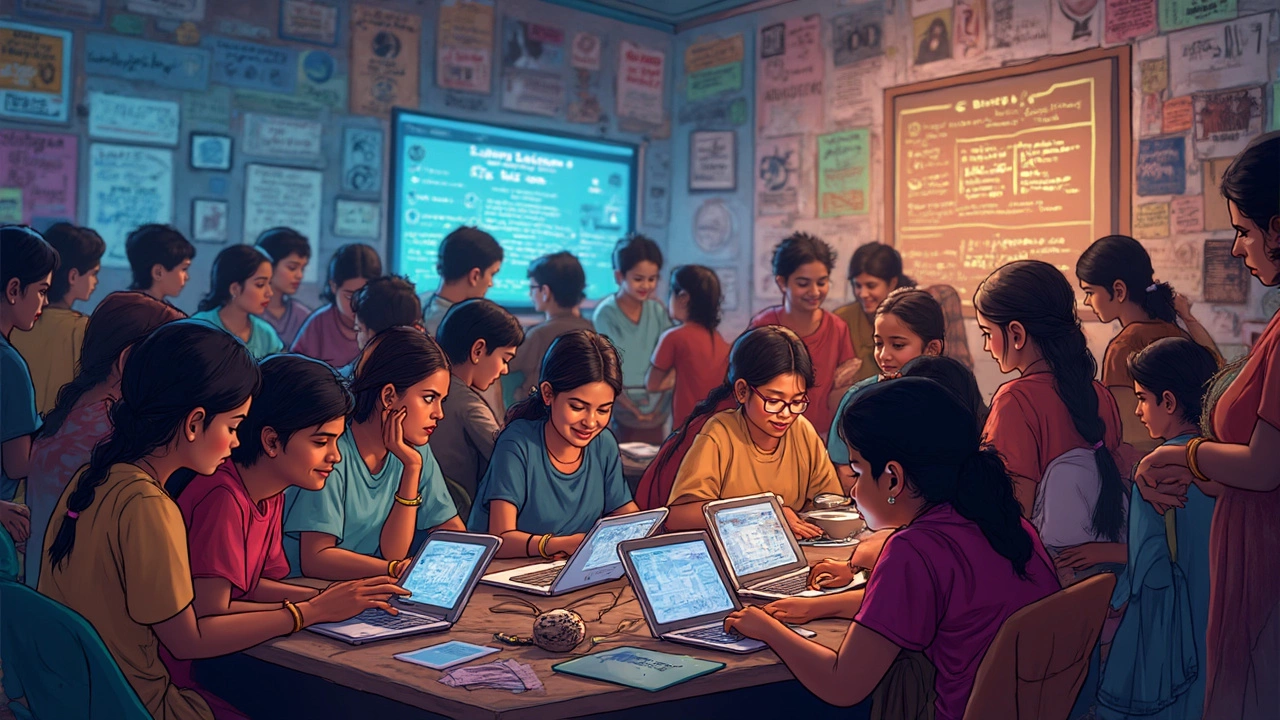Ever wondered if you can learn to code all by yourself? The simple answer is yes! With the internet stacked with resources, it's like having thousands of teachers at your fingertips. No need to sign up for expensive classes right away.
First things first, why do folks choose this solo path? It's mostly about flexibility. You get to set your own pace and study at those odd hours when inspiration strikes. Plus, it's budget-friendly compared to formal classes.
However, it doesn't hurt to have a plan. Start by picking a programming language that matches your goals. Want to dive into web development? Try HTML, CSS, and JavaScript. For something like data science, Python's your buddy.
- Why Learn Alone?
- Finding Resources
- Choosing the Right Language
- Setting a Schedule
- Joining a Community
- Building Projects
Why Learn Alone?
Learners are embracing the idea of teaching themselves to code without traditional classrooms. So, what's really inspiring this trend?
Flexibility and Independence
One of the biggest draws is the freedom to learn at your own pace. You can dip into a lesson at any time, whether it’s early morning or late at night. This means you can juggle coding with a full-time job, other studies, or family commitments.
Cost-Effectiveness
Education can be expensive, but self-learning cuts a lot of those costs. The internet is home to countless free and affordable resources. Websites like Codecademy, freeCodeCamp, and Coursera offer courses that won't break the bank.
Personalized Learning Experience
Self-learning allows you to tailor your journey to fit your personal interests and career goals. You choose the programming languages and projects that excite you the most. Want to create a mobile app or explore web development? The choice is yours.
Immediate Application
By learning on your own, you can instantly apply what you learn to personal projects. This hands-on approach reinforces your understanding and keeps the motivation levels high.
Survey Insight
According to a survey of solo learners conducted in 2023, about 60% believe that self-paced learning is more effective than classroom learning when it comes to coding. Students cited feeling less pressure and more control over their education.
Tackling programming challenges alone might feel daunting at first, but the flexibility, cost savings, and personalized learning paths make it a very tempting option for many budding coders.
Finding Resources
Diving into the world of coding all by yourself is like setting out on a treasure hunt. You’ll need some good maps, or in this case, resources, to guide you. The internet is your best friend here, packed with plenty of learning materials that range from beginner-friendly to absolute pro level.
Online Courses and Tutorials
If you’re just starting, platforms like Coursera, edX, and Udemy offer courses on different programming languages. These courses can be free or paid, with tons of user reviews helping you pick the right one. They often feature exercises and quizzes to test your understanding, so you're not just passively watching videos.
Coding Specific Platforms
Then there's Codecademy and freeCodeCamp, which are like the gym memberships of the coding world. They provide interactive lessons where you write code straight away. Coding here is a hands-on deal, and you'll get to see your progress in real-time as you tackle each new concept.
Books and E-books
If you learn better with text, don’t skip out on books. Classics like "You Don’t Know JS" for JavaScript or "Automate the Boring Stuff with Python" are both highly recommended reads.
Video Tutorials
Not everyone learns the same way, and if you prefer video content, YouTube is a goldmine. Channels like Traversy Media and The Net Ninja cover a broad spectrum of coding topics – from the basic ropes to more complex concepts.
Finally, don’t underestimate the coding community on forums like Stack Overflow or Reddit’s learning subreddits. These platforms let you ask questions, share your progress, and even contribute your own knowledge as you grow more confident. Remember, it's not just about reading and watching but applying what you learn. As you move forward, keep practicing and start building small projects. That's where the real learning happens!
Choosing the Right Language
When you're just starting, picking the right coding language can feel overwhelming. But don't worry, it's simpler than it seems once you break it down. Consider your goals. What do you want to build? Understanding this can point you in the right direction.
Interested in web development? Focus on languages like HTML, CSS, and JavaScript. They're essential for creating anything from simple web pages to dynamic web applications. JavaScript, in particular, is a versatile part of modern web development.
For those eyeing a career in data science or machine learning, Python is the go-to choice. Its simple syntax makes it a favorite among beginners and pros alike. Plus, it's packed with libraries for data analysis and visualization. A study found that Python is used by over 80% of developers in these fields, which speaks volumes about its popularity.
If mobile app development excites you, then consider learning languages like Swift for iOS apps and Kotlin for Android. They're specifically designed to make creating mobile apps smoother and more efficient.
Consider ease and community support
Another factor when choosing a language is the ease of learning and community support. Languages like Python and JavaScript have massive communities. This means you can find heaps of online tutorials and help whenever you get stuck.
Remember, there's no wrong choice. Starting with any of these languages will give you a strong foundation. As you progress, you'll likely learn new languages anyway.

Setting a Schedule
Jumping into coding without a plan is like wandering a forest without a map. You might find some cool spots, but you're also likely to get lost. That's why setting a schedule makes a big difference. Your plan doesn't have to be a strict 9-to-5 deal. It’s more like setting daily or weekly goals to keep you on track.
Start simple. If you're new to this whole programming thing, consider dedicating at least 30 minutes a day to it. You can always adjust once you get a feel for your pace. Consistency is key, even if it's just a little bit each day. Like building a muscle, practice cements your skills!
Time Blocking
Ever heard of time blocking? It’s a nifty way to manage your day. Basically, you block out chunks of time for each task. Try splitting your coding practice into focused sessions, say, one for learning concepts and another for actual coding challenges.
- Morning Routine: Review what you learned the day before to keep it fresh.
- Midday: Dedicate time to new concepts or tutorials.
- Evening: Work on building something - start small!
Stay Flexible
Schedules are not set in stone. Life happens. Maybe you're swamped or feel under the weather. Don't stress. Just adjust your plan. The idea is to make coding a regular habit, not a burden.
One pro tip: Celebrate small milestones. Finished a challenging course? Tackle a tricky bug? Take a minute to pat yourself on the back. It keeps the motivation high!
| Task | Time Commitment |
|---|---|
| Learning New Concepts | 1 hour |
| Practice Challenges | 30 mins |
| Project Work | 1 hour |
Joining a Community
If you're set on the self-learning path, connecting with others can be a real game-changer. Why? Well, coding isn’t just about sitting in front of a screen alone. It's also about sharing ideas, solving problems, and celebrating little victories with others who get it.
Thanks to the internet, finding a community is easier than ever. There are tons of online forums like Stack Overflow and Reddit where you can ask questions, help others with their queries, or just poke around to see what challenges folks are dealing with. It's a goldmine for learning what the real-world coding problems are and how they get solved.
Where to Look?
- Social Media Groups: Platforms like Facebook and LinkedIn have groups dedicated to specific languages or programming niches. Join a few and see where you fit in!
- Meetup.com: This site is fantastic for finding local events where you can meet fellow coders, possibly leading to collaborations or friendships.
- Codementor: Always wished you had a mentor? This platform connects you with experts for 1-on-1 help. It’s like having a personal guide to steer you through tricky parts.
Being part of a community not only helps you stay motivated but also exposes you to industry trends and potential job opportunities. The connections you build can be as valuable as the coding skills you acquire, sometimes helping in areas like teamwork and understanding industry standards.
Stat Corner
| Platform | Active Users |
|---|---|
| Stack Overflow | 10+ million |
| Reddit Programming | 2.5 million |
Remember, whether it's an online forum or a local coffee shop meetup, these spaces are where you can celebrate breakthroughs and commiserate over bugs. So don’t miss out on joining these coding tribes; they might just make your learning journey a lot more enjoyable!
Building Projects
Once you've got the basics down, the real fun begins with building projects. This is where theory meets practice and you start to see your skills come to life. The best part? You're in control, turning ideas into reality through code.
Start Small and Simple
Diving straight into building complex apps can be overwhelming. Start with smaller, manageable projects. Think of something like a to-do list app or a simple calculator. These allow you to implement basic constructs like loops, functions, and data handling.
Incremental Complexity
When you're comfortable, gradually increase the complexity of your projects. Transition to creating a personal blog site or a simple game. Websites like GitHub can be a goldmine for inspiration and collaboration.
Step-by-Step Process
- Choose a Project: Pick a project that excites you.
- Plan It Out: Break it down into smaller tasks. Think Lego blocks, one step at a time.
- Start Coding: Begin with what you know, don’t aim for perfection.
- Test and Debug: Run your code often; it’s easier to fix smaller mistakes than larger ones.
- Get Feedback: Share with communities or forums. Constructive criticism can be invaluable.
Real-World Stats
Did you know that developers who regularly build projects as they learn tend to grasp concepts 45% faster? Leveraging real-life scenarios increases retention and understanding.
To wrap it up, building projects is your sandbox to play and grow. Just keep coding, keep learning, and soon you'll have a portfolio to showcase to the world!





Write a comment